Davenport Library, Putnam Want Your Pandemic Reflections
With a confluence of crises happening simultaneously, it’s obvious that we’re living through some very historic times.
The Davenport Public Library and Putnam Museum & Science Center want you to be part of that history as it’s collected, by submitting your personal, written impressions, documents, photos and/or video about life in the Quad-Cities during the Covid-19 era.
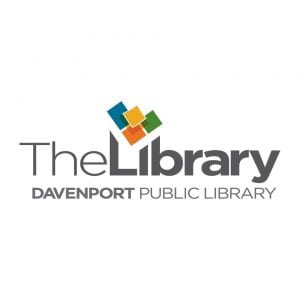 Both Davenport institutions are collecting individual or group reflections about how life has changed since the pandemic began early this year. With this collection, present and future generations of Quad Citizens will be able to learn what life was like for people during this time period.
Both Davenport institutions are collecting individual or group reflections about how life has changed since the pandemic began early this year. With this collection, present and future generations of Quad Citizens will be able to learn what life was like for people during this time period.
For the library’s “QC Life In the New Normal” project, it’s asking the public to compile essays, short stories, diary entries, poems, or other creative writing pieces as well as photos and other visual art. In addition, they suggest donating physical documents as well such as letters, handwritten documents, or anything you’d like to share.
“This collection will help us to capture this period of history through the words of the people by preserving real-time reflections about life in the Quad-Cities during the Covid-19 era,” according to the DPL.
Writing prompts include: How has my life changed? What am I grateful for? Who have I come to admire? How have I changed? How have I adapted and created new ways to connect?
Over the past 30 years, there have been several oral history projects that have taken place at the library, partnering with other groups, said Kathryn Kuntz, supervisor of DPL’s Richardson-Sloane Special Collections, on the lower level of the Main Library, 321 Main St.
They include recorded oral histories with World War II veterans, other veterans, local women leaders, and “In Your Own Words” – the latter aimed to the general public.
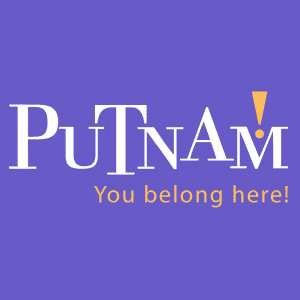 Last year, the library did an oral history on the Mississippi Valley Fair and the Iowa caucuses. “We wanted to talk about the flood (of 2019), but it all got surpassed by Covid,” Kuntz said. “So right now, we’re kind of at a standstill in collecting oral histories. We try and still get a couple in every once in a while, since we can’t really meet in person, we’re trying to figure out more digital ways of doing that.”
Last year, the library did an oral history on the Mississippi Valley Fair and the Iowa caucuses. “We wanted to talk about the flood (of 2019), but it all got surpassed by Covid,” Kuntz said. “So right now, we’re kind of at a standstill in collecting oral histories. We try and still get a couple in every once in a while, since we can’t really meet in person, we’re trying to figure out more digital ways of doing that.”
Kuntz has worked on some for the 100th anniversary of the Mississippi Valley Fair last year, like one man who talked of 4-H, farm life, raising pigs, or vegetables, and keeping track of everything they’ve done, with pictures and essays.
“It was a really big treat to hear about that and a lot of those family members who own farms in Scott County,” she said. “Sometimes their children took over the farm, and sometimes their grandchildren are still involved in 4-H, just like their children were.”
Compared to the “New Normal” project, the oral history features a library staffer interviewing people for an audio recording.
“It’s more of a conversation, where we’re trying to spur them on to think about different things in their memory,” Kuntz said. “They might not even think of sharing in the moment, but over the course of the conversation, they might think, this is something that might be really great for this conversation.”
For the QC Life in the New Normal, they’re open to anything – letters, essays, photos or video. “This is like a sub-project of our ‘In Your Own Words’,” Kuntz said.
Starting in April, the library had two phases of a contest to ask people how they were feeling, how they were coping, and how things changed during the pandemic, she said. They got some poems and reflections, including about health issues.
“2020 has been a chaotic year for all of us,” said a July 10 library blog. “Each person has had their life disrupted in some way from working from home, not being able to see loved ones, and so much more.
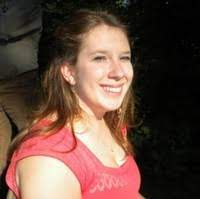
Kathryn Kuntz is Davenport Library’s Special Collections Supervisor.
“At the beginning of the Pandemic, we wanted to create a writing project where people of all ages could express how they are feeling, coping, and managing to live through this unexpected, life-changing event. This would also help us to capture this period of history through the words of the people in preserving real-time reflections about life in the Quad-Cities during the COVID-19 era.”
In the first round of the contest, 28 people (children through adults) submitted pieces, Kuntz said. There were three prizes for that, including two student winners. The library gave out two $20 gift cards to the Book Rack and one from Crafted QC. The second phase had one winner, since there weren’t as many submissions.
The DPL asked that people submit a writing piece of at least 200-500 words about how they were coping. It created videos to help the community come up with ideas about what to write about and to learn more about this project.
This chat features the importance of this writing project, suggestions for writing pieces, and how to submit them — QC Life in the New Normal Writing Project Conversation.
A Q-C mom’s winning reflections
The first winners of the project were Kate James, Lily Campbell, and Audrey Hayden, and here’s an excerpt from’s Kate’s essay –
Lucky for me, this Covid-19 crisis was not the first difficult circumstance I had to adapt to over the previous year. I was becoming more malleable to challenges I thought would never happen.
What made 2019 especially challenging took place eight months earlier: my beautiful, sweet little boy was diagnosed with Autism. I thought it would never happen. I knew Autism wasn’t a death sentence, for which I was grateful, however it felt like a life sentence. As I struggled accepting and processing this diagnosis, I was thrown into a new way of life that included 30 to 40 hours of intensive intervention therapies for my not even three-year-old son. Did I feel great? No, but I was learning how to cope.
With the emergence of the Covid-19 crisis, something that I said would never happen forced me to change, but it was okay because this wasn’t the first time. One sunny, warm afternoon a month after the social distancing order went into effect, my son and I walked along a path in Bettendorf at Devil’s Glen Park. Typically I was terrified to have him walk without tightly holding on to his hand. As many Autistic individuals are prone to wandering and running off, the fear of losing him kept me from letting him go.
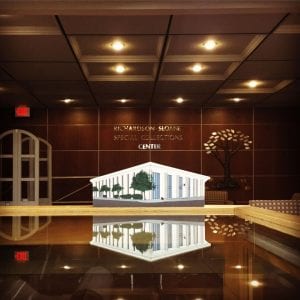
The Richardson-Sloane Special Collections Center.
However I knew that someday he would be too big, too strong to keep a firm grasp. I had to let him learn. I took a deep breath and let go of his tiny hand. He stopped, looked at me, and slowly, a bright smile spread across his tiny, round face. We walked together, side by side. We saw fluffy clouds in the vibrant blue sky, birds chirping as they flew by, and the sounds of the babbling stream guiding us along the way. As we walked back to my car, I peered down to see my precious, golden-haired boy still paddling alongside of me, and felt an epiphany
I had been so devastated and overwhelmed by a diagnosis that I felt should never happen that it took a global pandemic to make me stop and realize all the beauty that was still around me.
There will be no prizes for the next round, for which people can submit through December, Kuntz said.
“We’re trying to gather history as it’s happening,” she said. “We’re thinking about the 1918 pandemic of the flu; there were so many letters to and from people, articles about it in the newspaper, and personal accounts in diaries and journals, so we’re trying to get folks thinking about that, and how this is actually affecting our lives.
“So many of us, maybe we wanted to hug people and now we can’t, because we have to be socially distant,” she said. “We like close conversations at restaurants with our loved ones and that’s kind of all by the wayside right now. We want folks to think and share what’s going on in their lives.”
In the U.S., the early 20th century flu pandemic was first identified in military personnel in spring 1918. It’s estimated that about 500 million people or one-third of the world’s population became infected with this virus. The number of deaths was estimated to be at least 50 million worldwide with about 675,000 occurring in the U.S, according to the CDC.
Through Sept. 14, 2020, Covid-19 has infected 29 million people worldwide, with 924,704 total deaths. In the U.S., there have been over 6.5 million cases and 194,066 deaths, according to the New York Times.
The Putnam collects stories
Rachel Evans, community relations manager for the Putnam, said the Davenport museum is looking for “stories to help us preserve important moments in local history including what is occurring in our community during the Covid-19 pandemic, recent civil rights protests, and derecho.
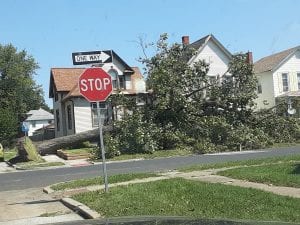
A photo of August derecho damage in Davenport sent to the Putnam.
“Stories might include videos, images, written documents or 3-dimensional items and be about what you’re doing at home, challenges in the workplace, or plans as the new school year approaches,” she said recently.
The Putnam has so far received photos of celebrations and working from home, written stories about experiences during this time – one from a 13-year-old explaining how he can play outside with a few friends in the neighborhood, videos, and artifacts including home-made masks, hand sanitizer, toilet paper and more.
The “New Normal” project fits with the library’s mission to be a repository of the community’s history, Kuntz said.
“Many libraries across the nation, they’re trying to think of how we can best serve our community and be a resource of information for them,” she said. “So this type of collecting and programming, we can use these as examples for future writers and researchers on what people were thinking in 2020 within their own community.”
“Just how attending church services has changed, or how they were able to communicate with their families, things like that,” Kuntz said. “It’s a good record of what this kind of life is like right now. As a library, we’re trying to represent the community and trying to provide resources to them. Special Collections is a great resource for many different things. We try and help folks find out answers to their questions. It’s just another way we can do that.”
They’re not putting any restrictions on what people submit – it can encompass the economic devastation, racial unrest, climate change, and political divisions that are convulsing the country, she added.
“Certainly, Covid is not happening in a bubble. It’s happening all around us in connection with a whole bunch of other stuff,” Kuntz said.
Washington, D.C. institutions collect
Three Smithsonian museums have launched coronavirus collection projects: the National Museum of American History; the National Museum of African American History and Culture; and the Anacostia Community Museum.
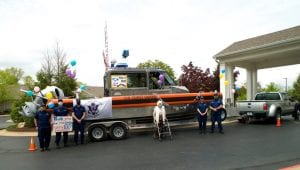
A parade celebrates a 100-year-old Bernie Bettini’s birthday, sent to the Davenport library.
Many other libraries and local historical societies have joined the documentation effort. For example, the Arlington Public Library’s Center for Local History is accepting physical submissions to its own Covid-19 archive project.
In its first week, they collected around 100 submissions: a handwritten grocery list; photos of people waiting in lines outside stores; a flier from Arlington Free Clinic detailing its coronavirus policies.
The library also launched Quaranzine, a weekly online collection of works by local artists responding to the coronavirus pandemic.
“Libraries today, they’re more than just books and buildings,” Henrik Sundqvist, a communications officer with Arlington Public Library, told NPR. “If it’s collecting stories or providing free public wi-fi at some of our parking lots, the library is really a critical part of the social safety network.”

The Quad City Quarantine Cookbook is now accepting recipe submissions.
The Historical Society of Washington D.C. also asked Washingtonians to document their experiences through videos, photographs, recordings and written journals for its “In Real Time” project.
In partnership with libraries throughout the Quad-City area, the Rock Island Public Library also has collected recipes for a Quad City Quarantine Cookbook, which is still being compiled. Contributors were encouraged to share what they’ve been making or baking to document life during the historically-significant pandemic of Covid-19.
For Davenport’s project, you may submit up to five items. There are three different ways to submit:
- Google form: https://forms.gle/MmVSx9SvpstsWFmF9
- Email: kkuntz@davenportlibrary.com
- Regular mail: Davenport Public Library, Attn: Special Collections, 321 Main Street, Davenport, IA 52806.
If you email or mail your submission, Special Collections staff will send you a form to fill out regarding your submission. For questions, contact Kathryn Kuntz at kkuntz@davenportlibrary.com.



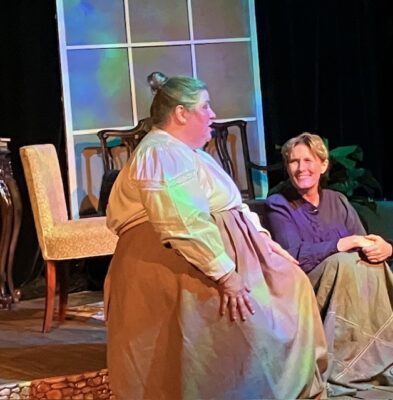
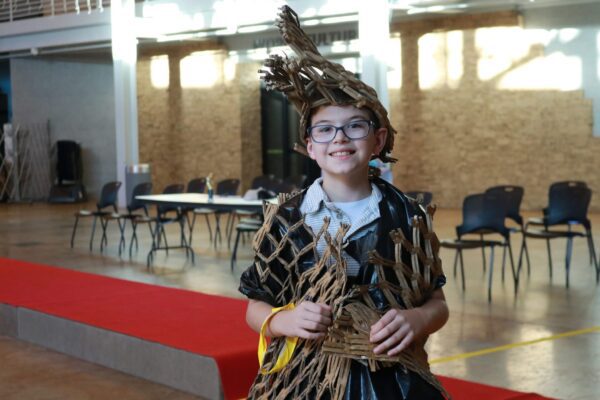








Leave a Reply
You must be logged in to post a comment.